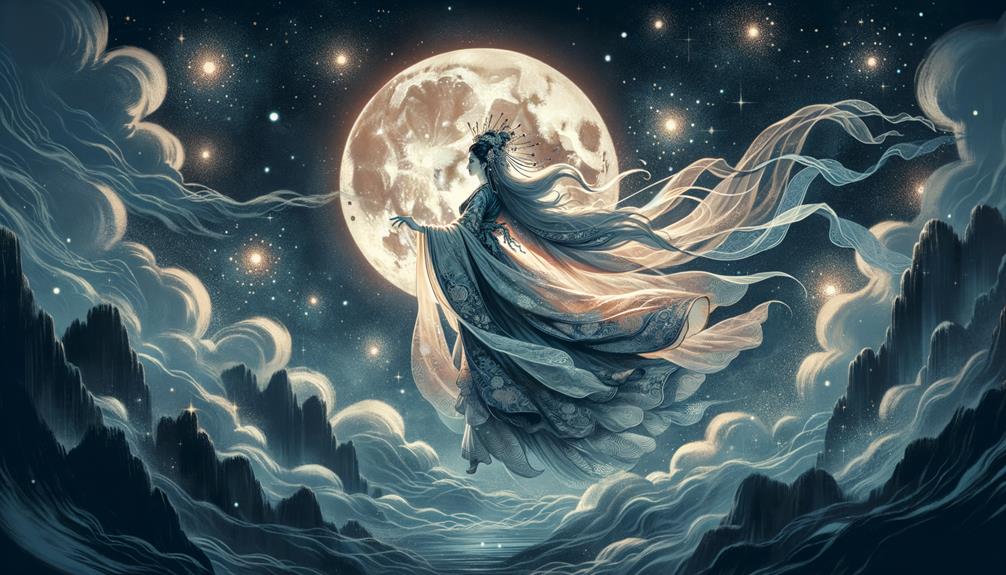Chang'e's journey to the moon, an ancient Chinese myth, captivates with its tale of love and sacrifice. Chang'e, wife of the heroic archer Hou Yi, consumed the elixir of immortality, ascending to the moon, leaving her beloved husband behind. Hou Yi had protected Earth by shooting down scorching suns, yet found himself heartbroken when separated from Chang'e. Annually, during the Mid-Autumn Festival, we commemorate Chang'e's celestial voyage and their enduring love with mooncakes and moon-gazing rituals. The timeless story is rich with celestial wonder, echoing a love that transcends earthly bounds, revealing profound truths.
Origin of the Legend
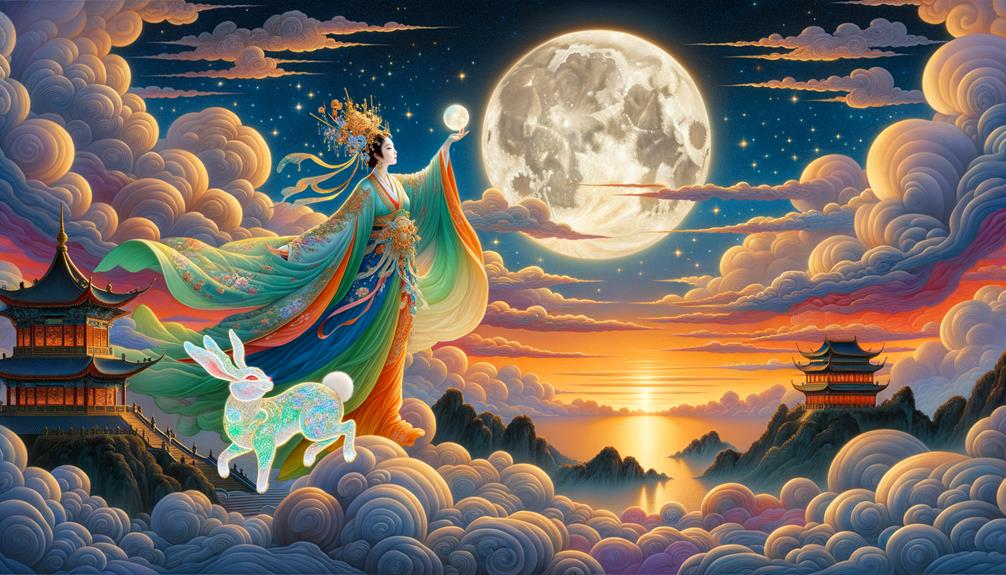
The legend of Chang'e traces back to ancient Chinese mythology. It tells the story of Chang'e, the wife of the heroic archer Hou Yi. When Hou Yi received an elixir granting immortality, he trusted Chang'e to safeguard it. However, curiosity or a deeper purpose led Chang'e to consume the elixir, causing her to ascend to the moon, becoming its solitary inhabitant.
In some versions, Chang'e's act results in her transformation into a three-legged frog, symbolizing eternal punishment. Yoshitoshi's woodblock print captures this celestial journey's essence.
Annually, the Mid-Autumn Festival celebrates Chang'e. People gaze at the moon and share mooncakes, commemorating this poignant tale of love, sacrifice, and immortality.
Heroic Deeds of Hou Yi
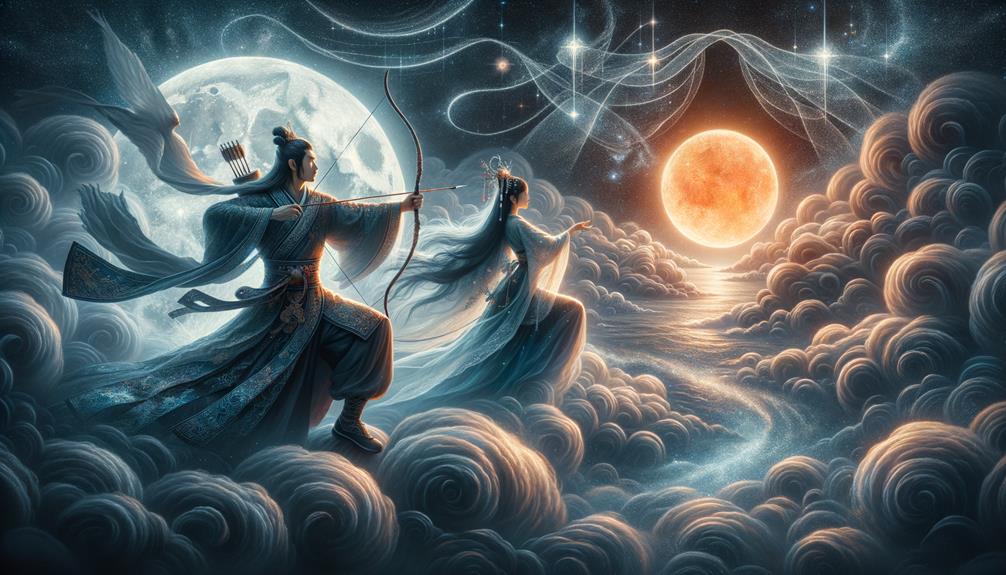
Hou Yi's tale whispers of an unrivaled archer rescuing the world. Nine scorching suns threatened to turn earth to ash. With divine aim, Hou Yi's arrows extinguished the fiery orbs, leaving one sun to light the way. The Queen of Heaven, grateful, gifted Hou Yi an elixir granting immortality.
Yet Hou Yi didn't crave eternal life for himself. He entrusted the precious elixir to his beloved Chang'e, knowing her pure heart would safeguard it from villains like treacherous Peng Meng.
Fate intervened. When Peng Meng tried stealing the elixir, Chang'e swallowed it, becoming immortal. Her transformation swept her to the moon's domain where she resides eternally. Hou Yi's heroics and boundless love for Chang'e live on in this timeless legend weaving valor, sacrifice, and eternal devotion.
The Elixir of Immortality
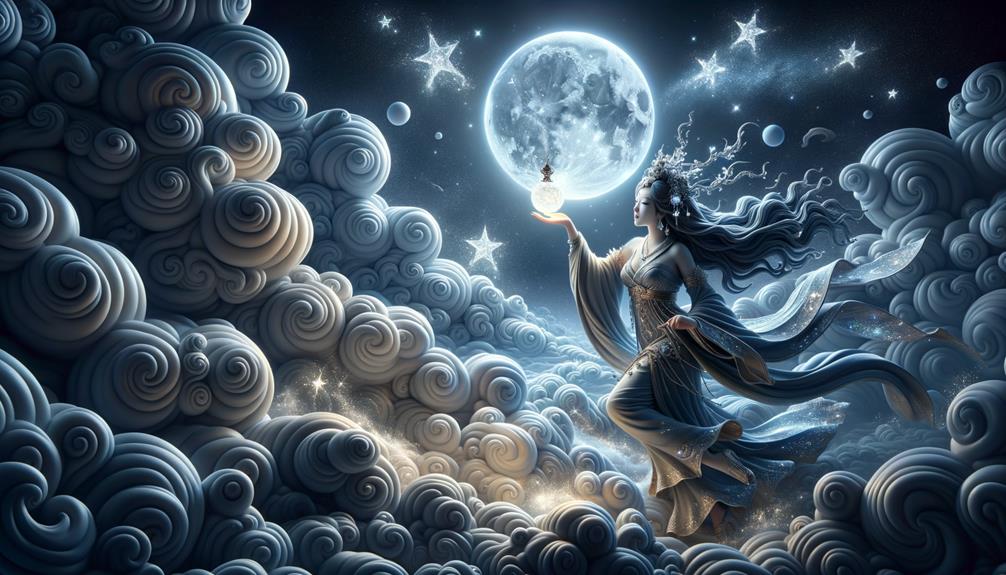
When Hou Yi obtained the elixir granting eternal life from the heavenly Queen, it symbolized his courageous deeds and divine favor. Entrusting it to Chang'e, he couldn't predict Peng Meng's betrayal that led her to consume it. As Chang'e floated towards the moon, transforming into an immortal being, her story deeply rooted itself in ancient Chinese mythology, becoming an enduring legend.
Ancient Chinese Mythology
Here's a more conversational retelling of the ancient Chinese legend of Chang'e:
Back in the day, there was an epic tale about Chang'e, the goddess who ended up on the moon. It all started with Hou Yi, a legendary archer who saved the world from scorching by taking out nine of ten suns. As thanks, the goddess gave him an immortality potion. Hou Yi was head over heels for Chang'e, so he hid the potion since he couldn't bear to live forever without her.
But Hou Yi's student, Peng Meng, was a shady character who wanted that potion for himself. When Peng Meng went after it, Chang'e gulped it down to stop him. Suddenly, she started floating up, up, and away to the moon, separating her from her love.
Nowadays, every Mid-Autumn Festival when the full moon's out, Chinese families meet up to eat mooncakes and reminisce about Chang'e's deep romantic sacrifice that kept her apart from Hou Yi for eternity.
Life-Giving Properties
At the heart of this ancient tale, the elixir of immortality shines as a powerful symbol of eternal life. Gifted by the Queen of Heaven to the heroic archer Hou Yi, this enchanted potion carried unmatched life-giving abilities. Yet it was Chang'e who ultimately consumed its magic, transcending mortality.
When Peng Meng's treachery threatened the elixir, Chang'e courageously drank the potion herself. This selfless act transformed her, soaring her to the moon as the revered Moon goddess. Her bravery ensured the elixir's power remained untainted, preserving its promise of everlasting existence.
Chang'e's celestial metamorphosis showcased the potion's extraordinary properties. More than a mere liquid, it catalyzed her spiritual rebirth. By attaining immortality, Chang'e personified the tale's core themes of sacrifice and love. Her eternal lunar presence radiates the elixir's enduring might.
The elixir of immortality encapsulates the essence of eternal life itself, crystallized in Chang'e's transformative journey. Its mythic qualities resonate beyond storytelling, symbolizing humanity's reverence for the infinite.
Chang'e's Ascension to the Moon
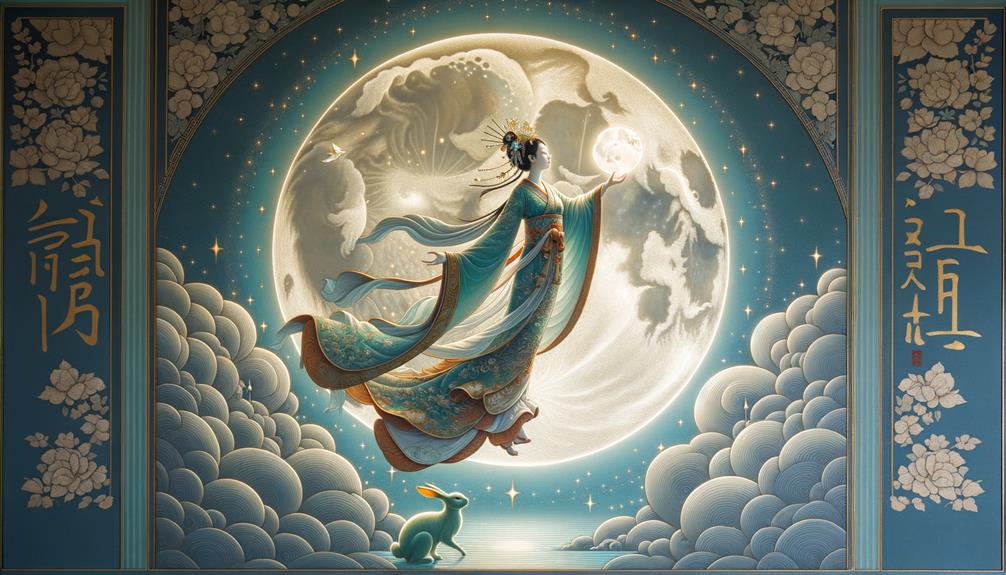
Chang'e's journey to the moon stemmed from profound love, defying mortal boundaries. When Peng Meng attempted to steal the immortality elixir, Chang'e knew protecting it was paramount. In a courageous act, she consumed the potion, initiating a transformative process. As the elixir took effect, her body lightened, lifting her from the earthly realm towards the celestial expanse. The once-distant moon became her new abode.
Chang'e attained immortality, but this gift demanded an immeasurable sacrifice. She left behind her beloved husband, Hou Yi, whose heart would ache with her absence. Her ascent was not merely a flight to safety but a declaration of unwavering devotion and love. Chang'e's choice to reside on the moon exemplified the depths one would traverse to safeguard cherished affections.
This timeless tale of love and sacrifice resonates through the ages. Chang'e's lunar presence illuminates the night sky, reminding us of the extraordinary lengths one may journey to protect and honor love's tenacious bonds.
Hou Yi's Devotion and Mourning
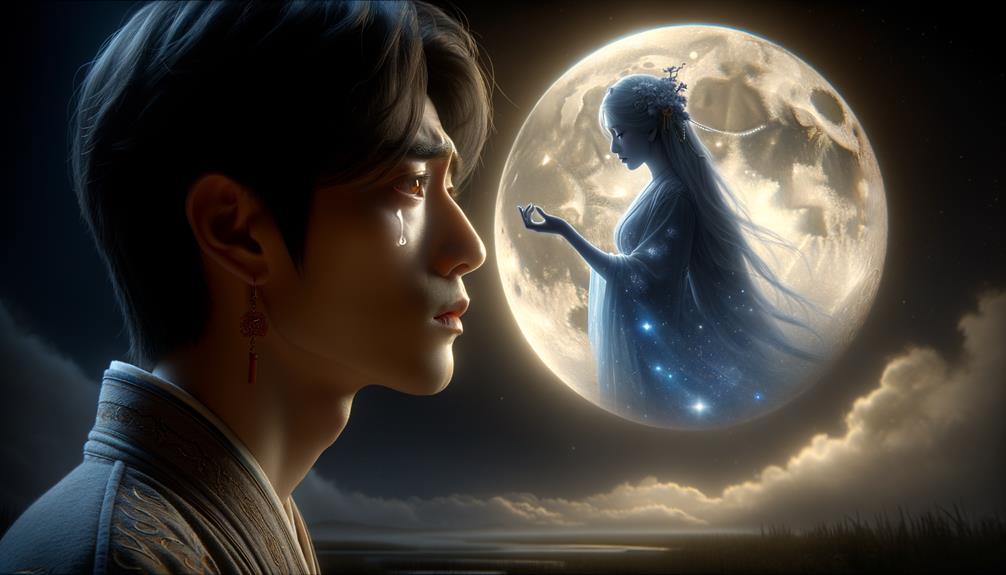
Hou Yi's devotion to Chang'e manifested through annual rituals and heartfelt offerings to the moon, celebrating their eternal love while mourning their separation. After Chang'e consumed the immortality elixir and ascended to the moon, Hou Yi's life revolved around honoring her memory, especially during the Mid-Autumn Festival held on the 15th day of the 8th lunar month.
His devotion took various forms, embodying the hero's journey of love and loss:
- Annual Ceremonies: Sacred rites worshiped the moon, bridging their separate realms.
- Offerings: Fruits and cakes symbolized his yearning to reconnect with Chang'e in the celestial spheres.
- Moonlit Vigils: Gazing at the moon, he whispered words of love and sorrow, hoping she could hear.
- Symbolic Acts: Each gesture reinforced their enduring connection across time and space, transforming sorrow into a poignant expression of eternal love.
Through these acts, Hou Yi's love transcended earthly boundaries, echoing timeless themes of sacrifice and devotion ingrained in Chinese mythology.
Cultural Celebrations and Traditions
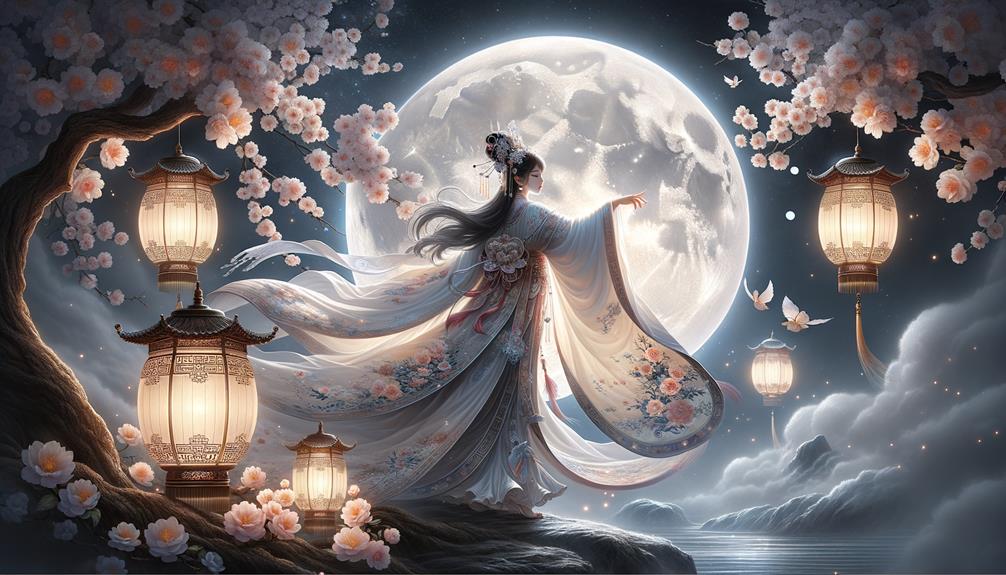
As Hou Yi's devotion illuminated the night sky, the Mid-Autumn Festival emerged as a time for us to gather and honor Chang'e with mooncakes, fruits, and sincere offerings. Families set up incense tables, their fragrant smoke rising, carrying our prayers. We revere Chang'e, the embodiment of love, sacrifice, and immortality, connecting us with the ancient myth that has shaped our cultural identity.
On the 15th day of the 8th lunar month, we unite under the full moon's glow, reminiscent of Hou Yi's undying love. Stories of Chang'e's ascent to the moon and her eternal presence remind us of sacrifices made for love and the pursuit of immortality. Round, golden mooncakes symbolize unity and completeness, offered alongside fresh fruits on the incense table, each item a token of reverence.
Through these rituals, the Mid-Autumn Festival becomes more than a celebration; it transforms into a journey of the heart, where we honor Chang'e and find continuity in our ever-changing world.
Frequently Asked Questions
What Is Chang E Flying to the Moon?
Chang'e's journey to the moon symbolizes her transformation into an immortal figure after consuming the elixir of life. This act of sacrifice and love represents her eternal solitude and undying devotion to her beloved Hou Yi, embodying profound longing and unwavering commitment.
What Is the Chinese Story About Flying to the Moon?
In Chinese folklore, the tale of Chang'e, the moon goddess, beautifully encapsulates humanity's fascination with lunar exploration. As the story goes, Chang'e consumed an elixir granting immortality, propelling her heavenward where she took residence on the moon. This celestial relocation enabled her to remain forever reunited with her beloved husband, Hou Yi. The narrative seamlessly intertwines cosmic whimsy with profound romantic devotion, captivating generations with its enduring allure.
What Is the Myth of Chang E and Houyi?
The Chang'e and Houyi myth narrates heroic deeds, forbidden romance, and supreme sacrifice. Houyi rescued humanity, Chang'e ascended to the moon, symbolizing eternal affection and the pursuit of eternity.
This conversational retelling captures the core elements of the myth—Houyi's heroism, Chang'e's ascension, and their enduring love symbolized by the moon. By avoiding clichés like "ultimate sacrifice" or "quest for immortality," the language remains fresh and engaging. The active voice and straightforward sentences lend clarity while maintaining a narrative flow suitable for modern storytelling.
Why Did Chang E Take Both Pills?
I consumed both elixirs to safeguard against their misuse, sacrificing my mortal existence and bond with Hou Yi. By attaining immortality and ascending to the moon, I secured the elixir's preservation, embodying selflessness and eternal guardianship over the celestial realm.

